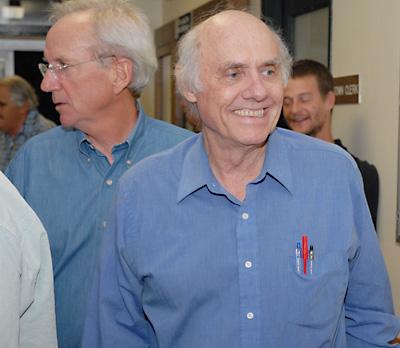Larry Penny Suspended Without Pay

Larry Penny, East Hampton Town’s director of natural resources, was suspended without pay for 30 days, pursuant to pending disciplinary charges against him, by the East Hampton Town Board at a special work session yesterday.
The 16 charges of misconduct, incompetence, and insubordination have to do with the storage, without authorization or proper permits, of animal parts or carcasses and formaldehyde in a basement storage room at the office condominium where the town has offices at 300 Pantigo Place in East Hampton, as well as with the way in which work for which the town received state and county permits was performed.
It is also alleged that Mr. Penny, whose salary this year is $95,910, failed to perform his duties in overseeing work done under environmental permits and allowed an unauthorized transfer of town assets — trees that were removed from the Barbara Hale Preserve in Springs, where permitted clearing was done, according to the charges, in violation of the terms of a permit. The private contractor that removed the trees was allowed to take possession of them.
Another charge of misconduct alleges that Mr. Penny failed to ensure within the allotted time the completion of habitat restoration work — the removal of 15 acres of phragmites in various town wetlands — for which the town received a state grant, “jeopardizing reimbursement of the town for time already spent by town employees under [the] grant.” The town also says the natural resources director failed to follow through on an unauthorized clearing case for which he was responsible.
In addition, the town claims that he failed to supervise the employees in his department, “including but not limited to the handling of financial matters.”
In the case of the animal carcasses, the legal document provided to Mr. Penny states that he was ordered by Bill Wilkinson, the town supervisor, to provide a plan for their disposal after they were discovered in September but did not do so. After an order to remove them in October was ignored, the town hired an outside contractor to come in and clear them away.
“The collection and retention of some or all of these animal remains is not required in order for you to perform your duties,” the charges state.
According to the town, the remains were stored “without proper safeguards to protect others from noxious odors and possible contact with such remains and any pathogens such remains may host.” The formaldehyde was also stored without proper records and monitoring, the charges state.
Mr. Penny had permits to collect certain wildlife, the document says, though some had expired. However, the town charges state, he did not provide the documentation to indicate that required annual reports were filed or that migratory bird carcasses had been delivered to the American Museum of Natural History, as required.
Town officials did not comment on the charges. The suspension, based on a unanimous vote of the board, was enacted under a provision of a state Civil Service law that allows a maximum 30-day suspension pending a hearing and determination of charges of incompetence or misconduct.
Mr. Penny has served as natural resources director for 26 years. After being notified of the suspension, he said yesterday that “they have been trying to get rid of me for a long time. The board is not pleased with my performance.”
“I think that it’s part of a bigger thing,” he said. “The election didn’t go so well for them. I had supported Wilkinson, but in 2010 they asked me to retire. I did not want to do that.”
“I’m not going to take it lying down,” he said. “I am going to try my best to defend myself and get back in. This is some kind of brutal politics. And this administration is certainly capable of brutal politics.”
He said he had been advised to file an appeal and would be calling a lawyer. “I am confident that I will overcome this in the end,” he said.
Mr. Penny, who writes a weekly nature column for The East Hampton Star, had fought for his position in 2008, when the town board proposed eliminating it and placing the Natural Resources Department under the control of the Planning Department.
Brad Loewen, a town councilman at the time and liaison to the department, had pointed to what he said were problems in the department under Mr. Penny’s leadership.
At the time, the move was seen by members of the public as an attempt to diminish the Natural Resources Department, and a crowd appeared before the town board to defend Mr. Penny and protest. Many said maintaining an autonomous Natural Resources Department was crucial to properly safeguarding East Hampton’s habitats, wildlife, and other resources. Others spoke of Mr. Penny’s expertise and knowledge of East Hampton’s environment.
Mr. Penny obtained legal counsel at that time, and the restructuring was eventually dropped, although some duties of the Natural Resources Department were shifted to other jurisdictions.
With Reporting by
David E. Rattray
